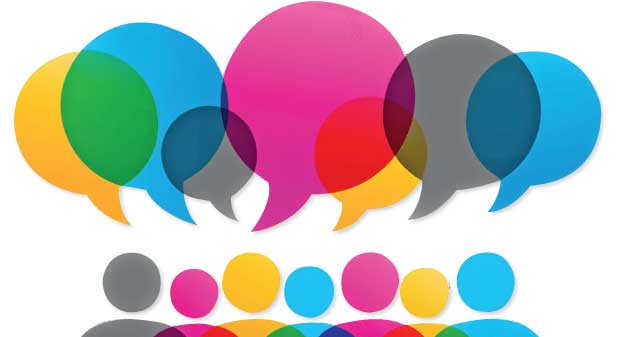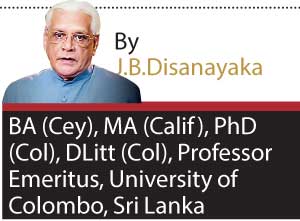Reply To:
Name - Reply Comment
Last Updated : 2024-04-24 06:20:00

As a Sri Lankan, I feel happy to be in Bangladesh on the UNESCO Mother Language Day for two simple reasons. Firstly, I belong to the ethnic group known as the Sinhalese who trace their origins to your land which was then called ‘Vanga’. ‘Vanga’ is the name used in Pali chronicles written in the fifth century ACE.
 The Sinhalese call themselves ‘Sinhala’ because they believe that they descend from a prince named Vijaya who was the grandson of a lion, Sinha, who roamed the jungles of Vanga. Hence the symbol of the lion in our national flag.
The Sinhalese call themselves ‘Sinhala’ because they believe that they descend from a prince named Vijaya who was the grandson of a lion, Sinha, who roamed the jungles of Vanga. Hence the symbol of the lion in our national flag.
Vanga has been identified as the land that covers the modern State of West Bengal and modern Bangladesh. In the distant past, Vanga was not a part of Bharat (India). It was an independent kingdom, which was not included among the sixteen maha-janapadas (great states) mentioned in Buddhist literature. I have a feeling that Bengal was made a part and parcel of India by the East India Company of England in the mid-18th century.
“East Bengal region, present-day Bangladesh” writes Prof. AfiaDil, “is an ancient land historically known as Bang (Vang) as part of the vast delta of the river Padma open to tidal waves from the bay and people used to build al (a ridge for protecting against floods) and thus the area came to be known as Bang-al. In the pre-Christian era Rig Veda, the name appears as Vanga. It was during the British period in the mid-18th century that it came to be spelt as Bengal. It was known along with Babylon, Egypt and China as an area rich in cross-cultural heritage and inter-cultural contacts by land and sea routes. It is a historical fact that in ancient times, the region was not looked upon as part of the so-called Bharat (India) but more a part of Eastern Asia.” (Bengali Nursery Rhymes, p. 12)
So today, I am happy to be back in my ancestral land, Vanga, to see my distant relatives.
Secondly, as a child, I used to sing a Sinhala folk song that has a reference to a country called ‘Bangalade:se:’ which I think is our name for your country even before you began to call your country, Bangladesh. The folk song is a dialogue composed of two questions and two answers. The first question and answer run thus in Sinhala:
“Olinda tibenne: koykoyde:se?
Olinda tibenne: bangalide:se.”
(Where do you find liquorice?
Liquorice is found in bangalide:se:”
The second question and answer run thus:
“Genathhadanne: koykoyde:se?
Genathhadanne: Sinhala de:se:”
(Where do you plant liquorice?
It is planted in sinhalade:se:”)
This folk song refers to a kind of seed known as liquorice, olinda. One wants to find out where olinda grows. He is told that olinda grows in Bangla-desh. Then he is asked where it will be planted? He is told that it will be planted in Sinhala-de:se, the land of the Sinhalese.
I am at a loss to understand the precise meaning of this dialogue. It implies that liquorice grows in abundance in Bangali-de:se, and that it will be brought from there and planted in Sinhala-de:se. What matters is that it refers to a land (de:se) called Bangli,Bangla-de:sh.
It also refers to a land called Sinhala-de:se, the land of the Sinhala. Sri Lanka has been called‘Sinhala dvipa’ (Island of the Sinhalese) in the past. So this is a folk poem that links our two lands.
Liquorice, sometimes called Indian liquorice, (Abrusprecatorius) is a creeper that bears a red coloured seed that is used in a folk game known as ‘olindakeliya’, which was once very popular among women of the royalty. Fifty-six seeds are used in this game which is played on a wooden board that has 14 holes in two rows (seven in each row).
I call myself a Sinhalese, not because of my blood or my facial features, but because Sinhala happened to be my mother tongue. If my mother was Tamil by ethnicity, I would have learnt Tamil as my mother tongue and I would think of myself as a Tamil.
These seeds were also used as the smallest of jewellers’ weights. Was there any kind of game in Bangladesh using liquorice?
Today we are here on a mission: to share our experience as two multilingual nation-states in achieving a common goal: national development. We meet here on a day of special significance, the UNESCO Mother Language Day, a day that gave birth to a new nation, Bangladesh.
In this paper, I will focus my attention on four main themes: language as the most distinctive feature of the human race, language as a symbol of ethnic identity, multilingualism, and finally, national development.
Language is the most distinctive feature of the human race. Language is not a thing but a competence that every average human being possesses. It is a unique competence that gives the speaker a competence to create a novel sentence when he needs one to express his thoughts.
Man discovered this linguistic competence many millennia ago. The discovery of language is one of the three most important revolutions in the history of mankind. The first was the discovery of symbols, that is, the use of something for something else. It paved the way for the discovery of language because language is nothing but a set of arbitrary symbols. Thirdly, man discovered another set of symbols to stand for the sounds used in language, so that he could take language beyond time and space. Language gave the man a tool that no other living being possesses, making him unique in the animal world. It is the most crucial line that divides man and animal. Language made man the founder of human civilization and culture.
However, we are born without a language. We all cry, scream and yell but we cannot speak. Though we cannot speak, we have the physical and mental capacity to learn to speak. As the infant is fed by its mother, day in and day out, the infant begins to imitate the sounds produced by its mother. The mother and the infant begin to communicate with each other in language. This language is thus called ‘the mother tongue’ in English. In Sinhala, the mother tongue is called ‘mavubasa’ or ‘ma:trubha:sha:’.
The mother tongue that every human being learns first is also called his ‘first language’. All other languages that a man acquires later are collectively called ‘second languages’. The mother language becomes one’s most powerful and efficient medium of communication. Sometimes one’s mother tongue is referred to as the language of his or her heart (hadabasa).
Secondly, the mother language becomes an important symbol of ethnic identity. Neither blood nor physiological features help in the identification of ethnicity.
I call myself a Sinhalese, not because of my blood or my facial features, but because Sinhala happened to be my mother tongue. If my mother was Tamil by ethnicity, I would have learnt Tamil as my mother tongue and I would think of myself as a Tamil.
The mother language, being the most crucial symbol of ethnic identity, gives members of that community a sense of pride and self-respect. As a result, any attempt to harm, belittle or disparage the mother language is considered an act of treachery and disrespect. The mother language thus becomes not only the most powerful medium of communication but also a symbol of ethnic identity.
Modern history tells us of multilingual nations that ran into conflict, disharmony and war because of their language policy. Sri Lanka and Pakistan are two classic examples of this unfortunate episode.
Sri Lanka is now in the process of building a new nation where all ethnic groups, the Sinhalese, the Tamils, the Muslims and the Burghers, can live in peace, harmony and integrity.
In order to achieve national development, steps have been taken by many institutions to build national unity through mutual understanding among speakers of different languages.
Accordingly, a Presidential initiative for a Trilingual Sri Lanka has been launched with a view to spread the competence of the two national languages, Sinhala and Tamil, and the link language, English, among the communities at large.
The task of implementing this programme is in the hands of several Ministries, departments and commissions. Among the ministries, the most important is the Ministry of National Co-existence, Dialogue and Official Languages.
The compilation of textbooks, trilingual dictionaries and glossaries of technical words is in the hands of the Department of Official Languages. Complaints regarding the implementation of the Official Language Policy are handled by the Official Language Commission.

Add comment
Comments will be edited (grammar, spelling and slang) and authorized at the discretion of Daily Mirror online. The website also has the right not to publish selected comments.
Reply To:
Name - Reply Comment
US authorities are currently reviewing the manifest of every cargo aboard MV
On March 26, a couple arriving from Thailand was arrested with 88 live animal
According to villagers from Naula-Moragolla out of 105 families 80 can afford
Is the situation in Sri Lanka so grim that locals harbour hope that they coul